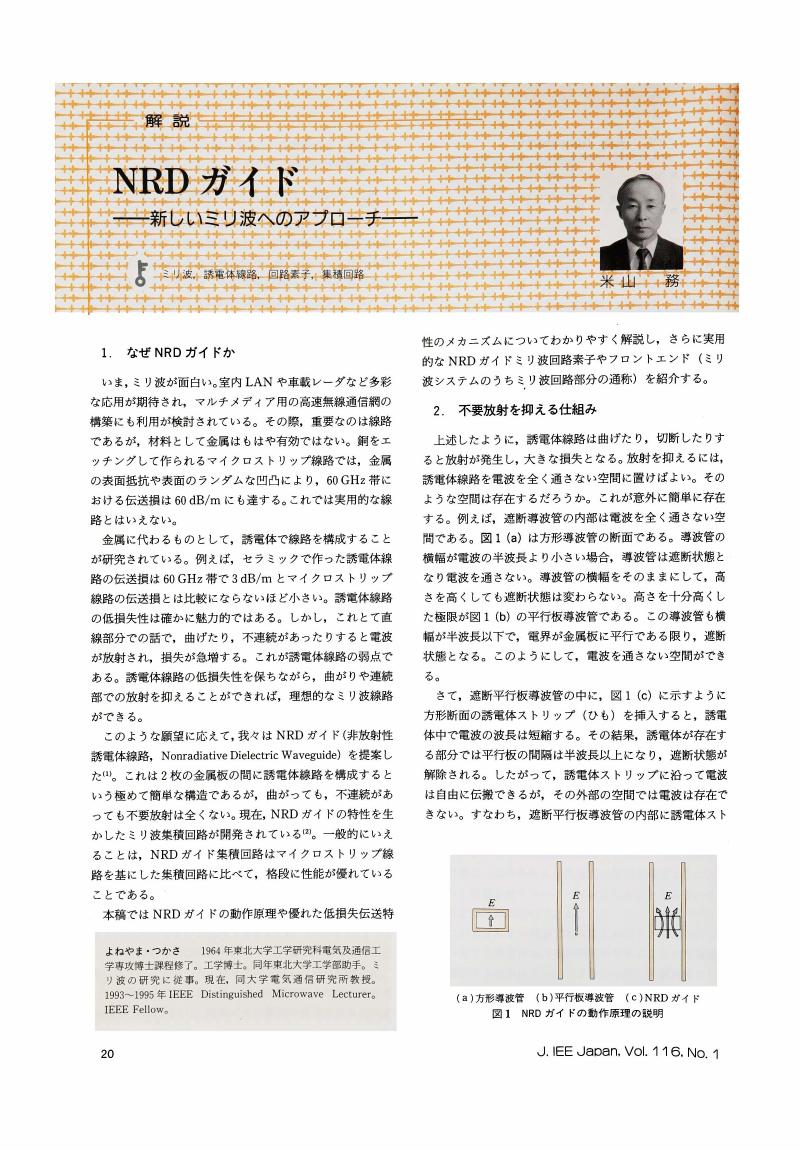1 0 0 0 NRDガイド-新しいミリ波へのアプローチ-
- 著者
- 米山 務
- 出版者
- 一般社団法人 電気学会
- 雑誌
- 電気学会誌 = The journal of the Institute of Electrical Engineers of Japan (ISSN:13405551)
- 巻号頁・発行日
- vol.116, no.1, pp.20-23, 1995-12-20
- 参考文献数
- 2
- 被引用文献数
- 4 1
1 0 0 0 OA NRDガイド 新しいミリ波へのアプローチ
- 著者
- 米山 務
- 出版者
- 一般社団法人 電気学会
- 雑誌
- 電気学会誌 (ISSN:13405551)
- 巻号頁・発行日
- vol.116, no.1, pp.20-23, 1995-12-20 (Released:2008-04-17)
- 参考文献数
- 2
- 被引用文献数
- 1 1
1 0 0 0 測距用60GHz帯NRDガイドパルスレーダ
- 著者
- 黒木 太司 山岡 幸一 石川 頌平 村田 雄介 出穂 剛史 米山 務
- 出版者
- 一般社団法人 電気学会
- 雑誌
- 電気学会論文誌. C, 電子・情報・システム部門誌 = The transactions of the Institute of Electrical Engineers of Japan. C, A publication of Electronics, Information and System Society (ISSN:03854221)
- 巻号頁・発行日
- vol.128, no.6, pp.825-831, 2008-06-01
- 参考文献数
- 9
- 被引用文献数
- 1
An NRD guide pulse radar front-end was fabricated for level sensor applications at 60 GHz. Main emphasis was placed on circuit configuration. Typically, an oscillation power is divided by a junction circuit and is introduced into two parts. One is for transmitting wave, and the other is for LO wave to perform hetero-dyne detection. The frequency of the former is up-converted so as to be different from the frequency of the LO wave, and thus, a power amplifier is installed in the transmitting side due to low output power of the up-converted millimeter-wave. In this paper, we proposed a new circuit configuration, which consists of a Gunn oscillator with two output ports to eliminate a junction circuit, a direct pulse-modulator to obtain a high level transmitting power without an expensive millimeter-wave power amplifier, and a filter-based down-converter with an up-converter as a local oscillator.<br>Range finding was performed by using the NRD guide pulse radar, however multi-reflection occurred between a target and a planar antenna due to a pencil beam radiation of our developing planar antenna, so that precise distance estimation could not be performed for short range detection. With this in mind, an FPGA-based signal processor was developed in order to eliminate such multi-reflection. The sequential sampling method was employed to reduce experimental errors, which were investigated in terms of difference of periods between a modulated pulse train and a sequential sampling clock. The error of range finding was successfully reduced to be less than 2 % for the distance range from 2 m to 10 m under multi-reflection environment.
